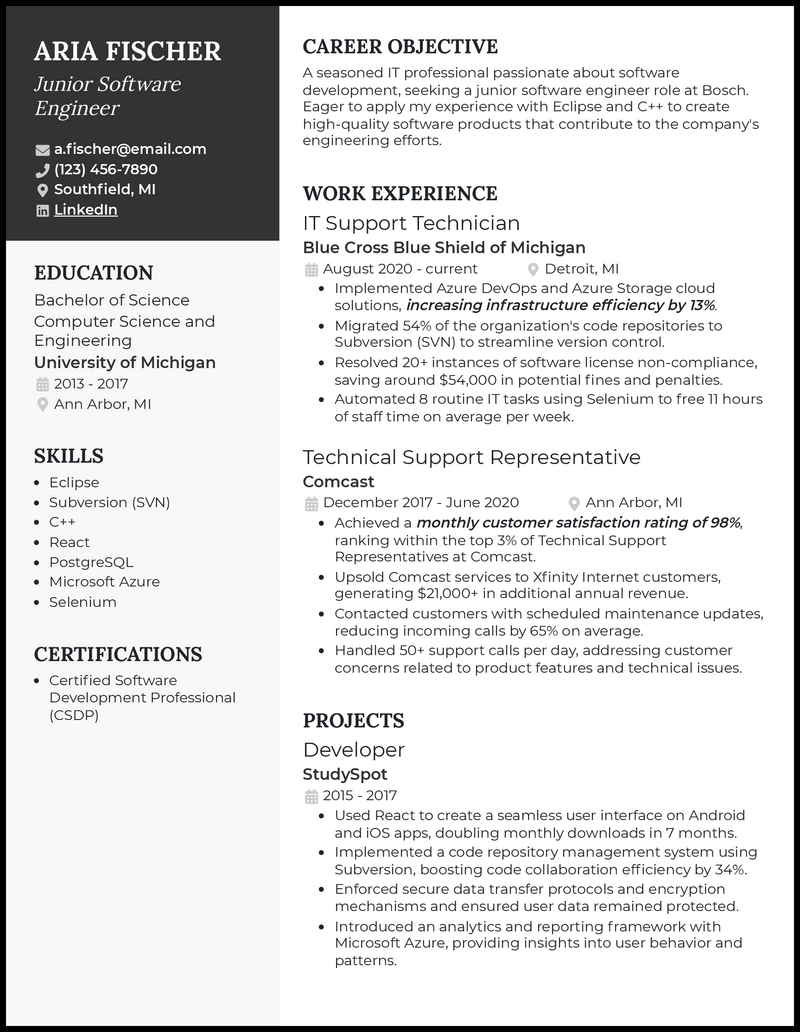You have a keen eye for detail, a natural understanding of complex algorithms, and a true love for software engineering. Since you’ve begun honing your skills, you’ve already gained experience in coding, debugging, and testing.
No two junior software engineering jobs are the same, so it can be tricky to know what to include when crafting your resume and complementary junior software engineer cover letter. A comprehensive application is your gateway to landing a great job.
We’re here to save you time and stress with our junior software engineer resume templates and expert tips, which have helped thousands of devs score their dream role. Add our AI cover letter generator to the mix, and land your job of a lifetime.
Why this resume works
- Are you applying to develop skills in languages you know or learn new things? Whatever the case, don’t shy away from talking about it in your career objective.
- Aria’s junior software engineer resume is a good example. Look at how they mention they’re eager to use Eclipse and C++ to create software products. Such statements give certainty to employers that even as a junior, you’re ready to get your hands dirty.
What Matters Most: Your Programming Skills & Software Engineering Experience

You’re already familiar with the entire software product life cycle. You’ve participated in code reviews, fixed your fair share of bugs, and planned out various software solutions.
Doing all of that requires some serious skills, and those skills are highly sought after. All you need to do with this section is optimize it to make recruiters see your value.
As a junior programmer, collaborating with senior devs is a huge part of the job, so soft skills are important too. However, it’s better to use this space to zone in on your technical skills and show hiring managers that you’ve got the know-how to handle the job.
Be highly specific. All you really need to list here are the programming languages you’re familiar with and the tools you’re proficient in. Adapt this list based on your industry.
9 best junior software engineer skills
- JavaScript
- React
- Angular
- Azure
- SQL
- Git Version Control
- Postman
- Agile/Scrum
- Visual Studio Code
Sample junior software engineer work experience bullet points
You may feel like you don’t have loads of relevant experience to talk about, but that’s not true. In fact, every project you’ve contributed to counts, and this is where you can explain them in more detail.
Try to tie this to your skills, and then ideally expand on it all in the cover letter. For example, if one of your top skills is JavaScript, what are your greatest achievements using that programming language?
Perhaps you’ve created a dynamic webpage using JS and jQuery, resulting in a 20% increase in user engagement. That sounds a lot more exciting than simply saying that you’ve worked on a jQuery project!
Here’s how you can use measurable impact to your advantage:
- Implemented Azure DevOps and Azure Storage cloud solutions, increasing infrastructure efficiency by 13%
- Reduced data retrieval time by 28% by optimizing SQL queries, resulting in an improvement in database performance
- Participated in weekly code reviews in a team of 8 developers, reducing the number of bugs introduced into the codebase by 39%
- Leveraged React to optimize a web application for mobile use, leading to a 17% increase in monthly web traffic
Top 5 Tips for Your Junior Software Engineer Resume
- It’s not all about coding
- You’ll spend a lot of time not just straight-up coding, but also doing all kinds of (equally important!) maintenance work. Demonstrate your versatility by talking about streamlining documentation or reviewing code in order to spot and fix a crucial software bug.
- Don’t list skills you’re not sure about
- You may have explored various programming languages, but only list those you’re somewhat confident in. You might be asked to provide a code sample or review code, so it’s best to highlight your strengths
- Express your communication skills
- It’s good to weave in some people skills in the work experience part of your resume. Do this in a clever way. As an example, talk about a time when you participated in a peer code review and helped a colleague overcome a software issue. Knowledge of Agile or Scrum methodologies is also a plus.
- A portfolio is key
- At this stage of your career, a portfolio that demonstrates your coding proficiency is crucial. This can just be your GitHub repository or your own website. Avoid using only common projects like a to-do list or a calculator—try to think outside the box to score brownie points.
- Show off your toolkit
- Outside of programming languages, relevant software is important too. Include popular IDEs, such as Eclipse or IntelliJ IDEA, as well as version control software, like Visual Studio Code and Git, to show that you’re ready to go.
Software engineering is more about the know-how and you’ll often be learning on the job. As such, it’s better to emphasize your coding projects than unrelated jobs.
We really don’t recommend it. Junior software engineer roles are highly competitive, so it’s best if you read the job description and shuffle your work experience, skills, and career objective to match it.
You can, but they’re often overlooked by recruiters. If you do add some, make them relevant, like robotics, AI, or even just programming.










